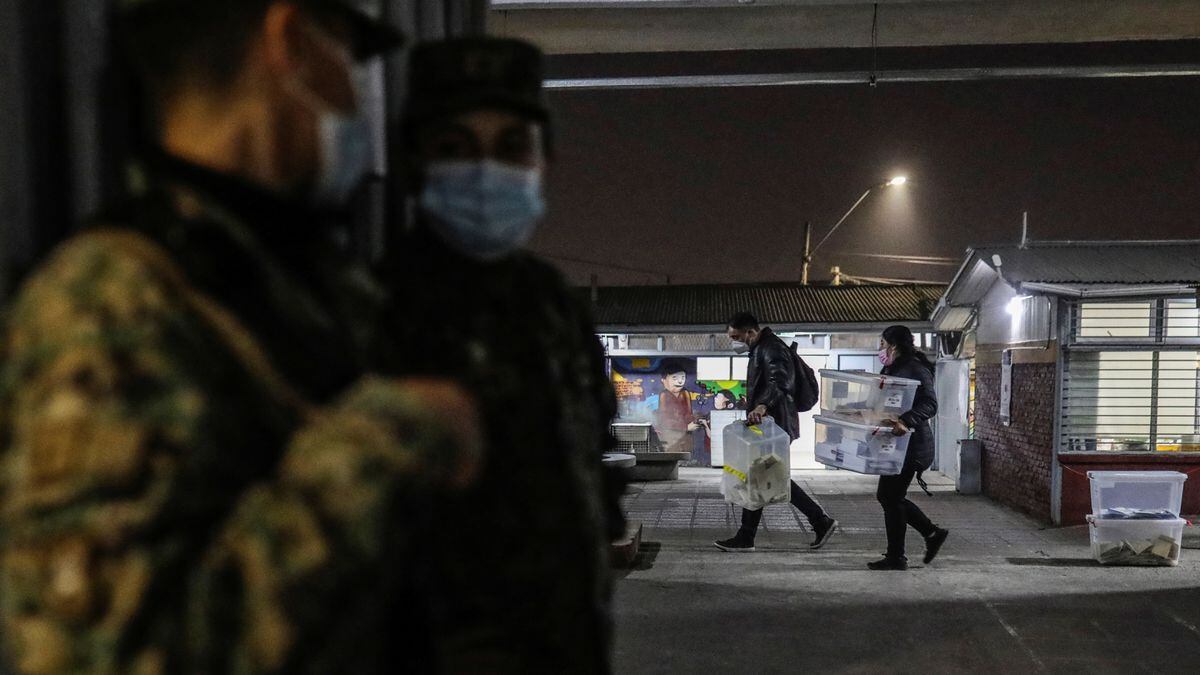[ad_1]

In a civic day which “passed successfully”, according to the authorities, 20.5% of Chilean voters authorized to vote went to the polls on Saturday, the first of two days during which voters will be elected. 155 voters who will draft the new Constitution, regional governors and municipal authorities (mayors and councilors). 100% of tables were set up across the country (46,807) and were open for 10 hours, in accordance with current regulations. Chile had never held an election in two days before, a decision taken due to the covid-19 pandemic, which has 36,964 active patients nationwide as of Saturday. This evening, in an unprecedented way, the polling stations are guarded by the armed forces and the guards of the electoral service (Servel), within the framework of strict security measures.
“We look forward to a quiet night. No ballot box or box of electoral material has been left open and unguarded as procedure requires, ”said Servel board chairman Andrés Tagle.
More information
Participation will be one of the priority issues of these multiple elections, considered to be the most important of recent decades and in which regional governors are chosen for the first time. The number of voters who come to vote this weekend is of particular importance due to the ongoing constituent process, as the possibility of changing the current Constitution was the institutional commitment of the political class to channel the massive and violent protests of October 2019. With a final Electoral List made up of 14.9 million citizens – 200,000 more than in the October plebiscite – Chile is a country with a voluntary vote and with an abstention that does not rise by 50%. In the constitutional referendum of seven months ago, where 80% of the citizens decided to modify the Fundamental Charter in force since 1980 – although it was reformed fifty times both at the end of the dictatorship and in democracy -, there was a 50.91% stake.
In Chile, the low turnout is a phenomenon that has increased since the implementation of voluntary voting in 2012: it went from 87% in 1989 to a record level of 36% in municipal elections in 2016. The percentage of voters voters who went to the polls today (more than three million), it is therefore considered good according to specialists, given the innovation of the vote on a Saturday. The challenge will be this Sunday, where it is hoped that the members of the polling station will arrive at the polling stations and reopen the polling stations soon.
The difference in turnout on the first day of elections in Chile is observed between regions and, in turn, in municipalities of the same city. The region with the highest percentage, Libertador Bernardo O’Higgins, south of Santiago, now reaches 22.13%. The region with the lowest participation today is Antofagasta, in the north of the country, with 14.81%. In the capital, for their part, differences are again observed between the rich and popular sectors. In La Pintana, one of Santiago’s most popular towns, turnout has barely reached 13.69% until tonight. In Vitacura, one of the richest municipalities, it reached 41.31%.
It is a complex choice. For starters, because it’s about four elections in one (out of the 10 elections that were imposed in the tight six-month period). For example, for a citizen who resides and votes in Santiago Centro, he must choose between 78 candidates for the constitutive convention. For governors, there are eight candidates. For the mayors, there are six candidates. For Santiago advisers, there are 92 options. In some municipalities, such as Santiago itself or the popular La Florida in the capital, the vote for councilors reaches a height of 46 by 63 centimeters. As observed during the day, there were some difficulties, especially among the elderly – who had preferential hours on Saturday afternoons – to fold the paper.
The pandemic hasn’t helped either. Much of the capital is still under quarantine, even if it is enough to show that they will vote to leave their homes without difficulty. This Saturday and Sunday, non-waivable holidays have been declared and there is public transport, such as the Santiago metro, which is free. But the numbers for the pandemic remain high. According to data provided this Saturday by the Ministry of Health, there have been 6,769 new cases (1,280,252 cases in total, throughout the health crisis), 36,964 active cases and 87 deaths in the last 24 hours ( out of a total of 27,734 deaths). Vaccination, however, gives a little respite on these election days: 9,006,139 people were vaccinated with the first dose and 7,457,662 with the two doses, or 49.1% of the target population.
On the first day of the Chilean elections, a good part of the 16 presidential candidates voted (there are legislative and presidential elections in November). The president of the Senate, the Christian Democratic senator, Yasna Provoste, of Diaguita origin, chose to vote in the green ballot for the seats reserved for indigenous peoples, which will have 17 seats in the constitutional convention of 155 members. The President of the Republic, Sebastián Piñera, voted early. “Voting is voluntary by law, but I think it is an obligation as a moral imperative,” the president said.
Subscribe here wing newsletter of EL PAÍS América and receive all the informative keys of the current situation in the region.
Source link
 Naaju Breaking News, Live Updates, Latest Headlines, Viral News, Top Stories, Trending Topics, Videos
Naaju Breaking News, Live Updates, Latest Headlines, Viral News, Top Stories, Trending Topics, Videos
